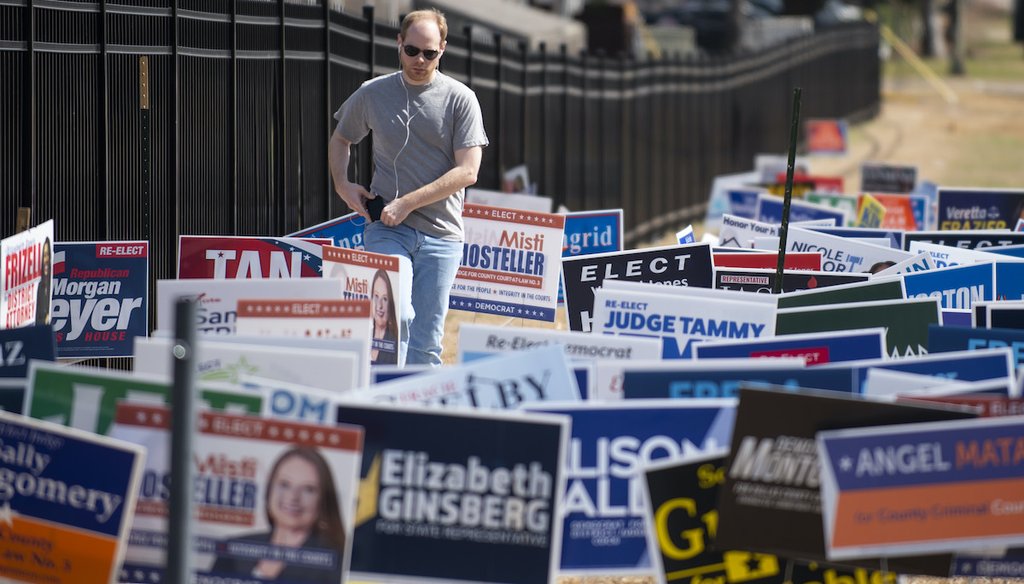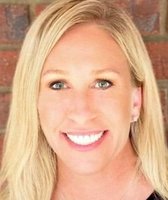Stand up for the facts!
Our only agenda is to publish the truth so you can be an informed participant in democracy.
We need your help.
I would like to contribute

A voter walks through a field of signs alongside Park Lane to participate in the primary election at Our Redeemer Lutheran Church in Dallas, Texas on Tuesday, March 1, 2022. (AP)
If Your Time is short
-
Social media posts claimed that primary voters were not allowed to cast ballots at certain voting sites in Texas on March 1. Posts alternately claimed it was Democrats or Republicans that were being excluded.
-
Many counties experienced a shortage of election workers. So the voting problems were likely real, but they did not appear to be widespread.
-
Texas primary procedures are also to blame. County parties are responsible for hiring election workers, and in some places one side or the other did not adequately staff their voting site.
Texas was already in the spotlight for voting woes before Election Day March 1 due to a new law that added identification rules for casting ballots by mail that tripped up thousands of voters.
And then on Election Day, reports on social media went viral that either Republicans or Democrats were denied the right to cast ballots in person.
One person tweeted a photo of a hand-scrawled note at an unspecified voting site that said, "Sorry - no Democrat voting (not staffed)."
A Fort Worth-based voter tweeted, "Democratic machines were broken," and that she was directed to vote at another location. She later tweeted that she voted elsewhere.
A 24-second Twitter video of a Houston voting site, viewed more than 1 million times, showed a voter asking about casting a Republican ballot. An election worker responded, "I don’t have staff, so we are closed right now." The worker added, "You can vote Democrat …not Republican. I am sorry."
In this case, there was some substance to these claims, although it would be misleading to suggest there was widespread disenfranchisement. We found no evidence of that.
What was happening in Texas? It has to do with how Texas conducts primaries, with separate Democratic and Republican staff overseeing voting for their own parties. Staff shortages in multiple counties meant that voters of one party couldn’t vote at a particular site, at least temporarily. But they were often directed to another site.
Texas state law allows joint primaries where voters from both counties share voting equipment at the same voting site, or split primaries with separate equipment for Democratic and Republican voters at the same site. The two parties reach an agreement on whether to have joint or split primaries. The county political parties hire the election judges who work at the voting sites on Election Day.
News reports showed that multiple counties faced staff shortages. The Texas Tribune reported that voting sites in Dallas, Tarrant and Hidalgo counties reported missing either a Republican or Democratic Party election judge. In other counties, there were staff shortages but not closures.
In Tarrant County, there were 10 Democratic judges and two Republican judges missing on election morning. Tarrant County elections administrator Heider Garcia told ABC affiliate WFAA that the elections office asked Republican judges to help out and set up Democratic machines, but at a few locations the judges refused. In those cases, officials moved Democratic poll workers from other sites. As of 11 a.m., all locations were open.
A CBS station in Tarrant County showed a sign on the door of a voting site stating "Democrat party officials haven’t arrived. Republican primary only right now." The reporter tweeted that Democrat voters were directed to other voting locations within a couple of miles.
Most counties use voting centers that aren’t precinct specific. That means voters who can’t cast a ballot at one site can generally go to a nearby site. The viral video from the Houston site where a voter was told they could vote Democrat but not Republican was posted by a Texas private investigator early on election morning.
But Republicans did cast ballots at the site that day. Harris County elections spokesperson Leah Shah told us the site was the Hardy Senior Center, where 207 Democratic ballots were cast and 82 Republican ballots. (The county is predominantly Democratic.)
"It looks like the Republican judge was short-staffed," said Nadia A. Hakim, a spokesperson for Harris County elections. "Since the parties didn’t decide on hosting a joint election, it was their responsibility to fill the vacancies. In past primaries, the parties have made use of the emergency period that’s 20-days out from election day, where the office steps in to help with staffing. They did not for this election."
Common Cause Texas, a voter advocacy group, received reports of voters from both parties who had to wait to vote due to staff shortages, mostly in Tarrant and Harris counties, said executive director Anthony Gutierrez. (The Common Cause Education Fund has provided financial support to PolitiFact.)
Gutierrez said there is no central tracking system to show staff shortages or equipment concerns. We found no way to quantify how many voters were ultimately unable to vote in person on Election Day.
The secretary of state’s office heard sporadic reports of a lack of workers, said Sam Taylor, a spokesperson.
"But county election officials and parties quickly worked to fill gaps in staffing to ensure all polling locations were adequately staffed with the appropriate number of workers on each side," Taylor said.
Why were there shortages of election workers? Experts cited several reasons.
Some may not have felt comfortable with relatively new equipment. There’s also worries COVID-19; threats faced by election workers nationwide; or SB 1, the much-debated Texas law that includes civil penalties for election workers who violate provisions. Then there is the usual public apathy.
In Harris County, elections officials and political parties pointed fingers at each other. The county said both parties had trouble recruiting workers. Democrats blamed Republicans for forcing split primaries. Republicans said the county was at fault for equipment problems such as voters not able to submit a second page of their ballot.
Robert Stein, a political scientist at Rice University who studies elections, said it was likely a combination of factors.
"No matter what had transpired, it would have been difficult: The county changed election equipment, there was a change in state election law, and a change in training of poll workers," Stein said. "All those things made for a perfect storm."
PolitiFact Texas reporter Nusaiba Mizan contributed to this article.
Our Sources
Houston Public Media, About a third of Harris County mail-in primary ballots were rejected. There’s still time to correct them, March 1, 2022
Texas Tribune, Many voting locations throughout Texas did not open because of staff shortages, March 1, 2022
Texas Tribune, Thousands of Texas mail-in votes still in jeopardy under new GOP voting restrictions, March 2, 2022
Tweet by @SIUIntelligence, March 1, 2022
Tweet by Yvonne Mills (@nursebabe14), March 1, 2022
Tweet by Common Cause Texas (@CCauseTexas), March 1, 2022
Tweet by KamVTV, March 1, 2022
Washington Post, Rejected mail ballots, confused voters: Texas’s restrictive new law casts shadow over primary, March 1, 2022
Khou, Texas primary election: Harris County officials say they are on track to meet deadline, March 2, 2022
Khou, Harris County ballot counting completed just after midnight, unofficial results are in, officials say, March 3, 2022
ABC25, Live updates: Split primaries spur staff shortages in Texas, March 1, 2022
WFAA, Tarrant County was missing some Democratic poll workers Tuesday morning, March 1, 2022
CBS, Political Parties Don’t Recruit Enough Election Workers, Some Voters Turned Away In Tarrant County, March 1, 2022
Center for Public Integrity, Election officials scramble to find poll workers, Oct. 22, 2021
Telephone and email interview with Anthony Gutierrez, executive director of Common Cause Texas, March 1-2, 2022
Telephone interview, Leah Shah, Harris County Elections Administrator spokesperson, March 1-2, 2022
Email interview, Nadia A. Hakim, Harris County Elections Administrator spokesperson, March 4, 2022
Email interview, Sam Taylor, Assistant Secretary of State Communications in the Office of the Texas Secretary of State, March 1-2, 2022
Telephone interview, Odus Evbagharu, chair of the Harris County Democratic Party, March 2, 2022
Email interview, Antonio Arellano, ACLU of Texas spokesperson, March 2, 2022
Telephone interview, Robert Stein, Rice University political scientist, March 3, 2022






































